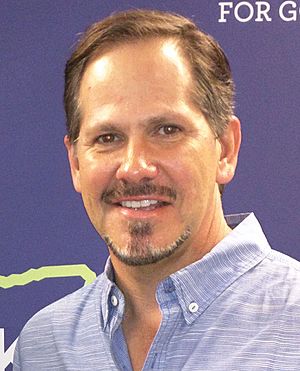Knute Buehler facts for kids
Quick facts for kids
Knute Buehler
|
|
|---|---|
 |
|
| Member of the Oregon House of Representatives from the 54th district |
|
| In office January 12, 2015 – January 15, 2019 |
|
| Preceded by | Jason Conger |
| Succeeded by | Cheri Helt |
| Personal details | |
| Born |
Knute Carl Buehler
August 1, 1964 Roseburg, Oregon, U.S. |
| Political party | Republican (before 2021) Independent (2021–present) |
| Children | 2 |
| Education | Oregon State University (BS) Merton College, Oxford (MA) Johns Hopkins University (MD) |
Knute Carl Buehler (born August 1, 1964) is an American doctor and politician. He served as a State Representative for Oregon from 2015 to 2019. He was a candidate for Governor of Oregon in 2018, running as a Republican. He lost that election to Democrat Kate Brown. In 2021, he decided to leave the Republican Party. He said this was because of how the party reacted to important events in the country. Today, Knute Buehler is not officially part of any political party.
Contents
Early Life and Education
Knute Buehler was born in 1964 in Roseburg, Oregon. He went to Oregon State University (OSU), where he played on the school's baseball team. He earned degrees in history and microbiology from OSU in 1986.
After OSU, Mr. Buehler became the first student from his university to receive a Rhodes Scholarship. This special scholarship allowed him to study at Merton College, Oxford in England, where he focused on subjects like philosophy, politics, and economics. Later, he graduated from the Johns Hopkins School of Medicine in Baltimore, Maryland, becoming a doctor.
Today, Mr. Buehler is an orthopedic surgeon, which means he is a doctor who specializes in bones and muscles. He lives in Bend, Oregon, with his wife and two children.
Political Career
Knute Buehler has been involved in politics for many years, holding different roles and running for important offices in Oregon.
Running for Secretary of State
In 2012, Knute Buehler ran for Oregon Secretary of State as a Republican. He was not successful in this election. He lost to the person who was already in office, Kate Brown, who was a Democrat.
Serving as State Representative
In 2014, Knute Buehler was elected to the Oregon House of Representatives. He represented the 54th district. .....
He was re-elected in 2016. Knute Buehler describes himself as a "moderate" politician. This means he often tries to find middle ground on issues. .....
Important Actions as Representative
In November 2017, Knute Buehler was the first Republican to ask for another Republican, State Senator Jeff Kruse, to step down from his position. This happened after serious accusations were made against Senator Kruse.
Running for Governor
Soon after being re-elected as a State Representative, many people thought Knute Buehler would run for Governor. On August 3, 2017, he announced he would run for Governor of Oregon in the 2018 election.
In May 2018, he won the Republican nomination, meaning he would be the Republican candidate for Governor. He then ran against the current Governor, Kate Brown, who was a Democrat. This was a rematch of their 2012 election for Secretary of State. Knute Buehler lost the general election to Kate Brown. Both candidates raised and spent a lot of money on their campaigns, setting new records.
Political Beliefs
Knute Buehler is seen as a fiscally conservative and moderate Republican. This means he generally believes in careful spending of government money. .....
On immigration, he does not support "sanctuary cities" or Oregon's statewide policy that limits how local police can work with federal immigration officials. He supports gay rights, including same-sex marriage. He also voted to stop "conversion therapy" from being used on young people. During his campaign for governor, he said he supported Oregon's laws about serious crimes, which were approved by voters in 1984.
Leaving the Republican Party
After some important national events in January 2021, and a statement from the Oregon Republican Party, Knute Buehler announced he was leaving the Republican Party. He decided to become a "non-affiliated voter," meaning he is not registered with any political party. He said it was a difficult decision for him.
See Also
- List of party switchers in the United States


